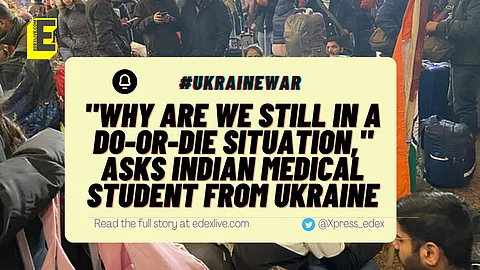

It has been a year since the Russian invasion of Ukraine and the evacuation of Indian medical students. Today, many of them find themselves torn between their dreams of becoming doctors and the fear of returning to a war-torn country. While some have found a way back to Ukraine, others have taken transfers to different countries or abandoned their MBBS dreams altogether. But for those who remain, the trauma of war and the uncertainty over their career prospects still looms large. "One year into the evacuation from Ukraine, we still have a question mark hanging over our career and I don't understand why we are still in a do-or-die situation," asks Harsh Goel, a student from Ivano-Frankivsk National Medical University.
On February 24, 2022, as the war in Ukraine began to take shape, these Indian medical students found themselves trapped in a foreign country amidst the chaos and violence of a conflict that was not their own. The sound of bombs exploding in the distance, the lack of food, water, and electricity, and the fear of never returning home were their realities. However, despite the evacuation by the Indian government, the students complain they got no further assistance as the question of the future of academics remains uncertain. Deepak Kumar, a student at the Ternopil National Medical University, recalls how he had to leave with just one bag, not realising that he would be away for much longer. “Didn't think we would have to stay for more than ten or fifteen days and now it has been a year and I am still here,” he says. Deepak, who is currently taking his online classes from India, is unable to transfer due to regulations set by the National Medical Commission (NMC). “The regulation only allows students who took admission before November 18, 2021, to be eligible to take transfers to a different country which is so illogical since we have so many people from our batch who have taken a transfer because their admission was early but we cannot,” adds Deepak in exasperation.
“About 20% of students have taken a transfer, while 10% have changed their stream altogether. The war has shattered their medical aspirations completely,” says Harsh Goel, as he shares his perspective on the situation. He speaks of the roller-coaster ride of being a refugee, a petitioner at the Supreme Court, and a student navigating a war zone in the past year. "When memories of the evacuation days pop up on galleries and social media, I am indeed a little shaken up. But then again, it helps me form a perspective that now that I’ve dealt with war, I have become capable of dealing with most of the challenges that come my way," he says. Despite the memories of the war and evacuation, Harsh says he can go back to study in Ukraine and is still here in India due to a lack of available visa slots.
RB Gupta, the President of the Parents' Association of Ukraine Medical Students (PAUMS), says, “Despite the ongoing conflict, a significant number of students have returned to the country to continue their studies.” Specifically, he says that around 50% of 5th-year students are back in Ukraine, with 40% transferring to different countries, and 10% studying online. Meanwhile, 99% of final-year students have returned to Ukraine. “Universities in the eastern part of the country have moved their campuses to the western part, where it is safer to hold offline classes. Unfortunately, first and second-year students cannot transfer, so some have chosen to enrol in different countries or change their majors, while others continue their studies online,” he adds.
“For me”, says Harsh, “Taking a transfer to another country is not a viable solution.” According to him, a transfer would mean picking up a new language and culture, which might not bring about a productive output in the end. Additionally, it would also mean investing a lot more money, which he cannot burden his parents with. “I know students who have lost a semester or more due to transfers. It is almost like a fresh start,” he explains, adding, “What surprises me the most is how unsupportive and in exile the Indian government made us feel.” Echoing the words of the young medico, RB Gupta reminds us of the number of attempts the students and others have made to negotiate with the government but the outcome has been futile. He asserts, “In the past year, I have realised that approaching the Supreme Court is ineffective. Only the NMC can provide the necessary relief, but since NMC operates under the Ministry of Education, the central government holds all the power, and so far, they have not been supportive." Furthermore, he asks, “Operation Ganga was great but what after that?”
RB Gupta also says that his appeal to the Indian government is to provide relaxation for an online course to all students and allow first and second-year students to make transfers to other countries. “This is the minimum that the government can do to support these students in such a challenging situation,” he adds. On the other hand, Harsh and Deepak are aware of the anxiety about whether they will ever get their degrees. However, since both of them have their universities located on the western side of Ukraine the situation is less grim. Deepak believes he will make it back to Ukraine in a couple of months if no other options remain in hand. “Our primary objective is to save our degree, so, whatever it takes, we are up for it, nevertheless the fight is not yet over as the Supreme Court is still hearing two petitions, one of the hearings being on March 15,” concludes Deepak as he clings to that little hope.
